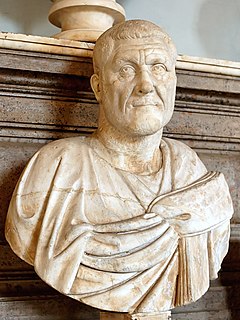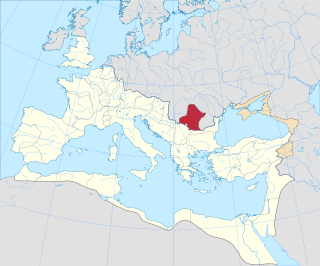Related Research Articles

Titus Livius, known as Livy in English, was a Roman historian. He wrote a monumental history of Rome and the Roman people, titled Ab Urbe Condita, ''From the Founding of the City'', covering the period from the earliest legends of Rome before the traditional foundation in 753 BC through the reign of Augustus in Livy's own lifetime. He was on familiar terms with members of the Julio-Claudian dynasty and even in friendship with Augustus, whose young grandnephew, the future emperor Claudius, he exhorted to take up the writing of history.

Moesia was an ancient region and later Roman province situated in the Balkans south of the Danube River. It included most of the territory of modern-day Central Serbia, Kosovo and the northern parts of North Macedonia, the whole of Northern Bulgaria, Romanian Dobruja and small parts of Southern Ukraine.
Lucius Aelius Sejanus, commonly known as Sejanus, was an ambitious soldier, friend and confidant of the Roman Emperor Tiberius. An equestrian by birth, Sejanus rose to power as prefect of the Roman imperial bodyguard, known as the Praetorian Guard, of which he was commander from AD 14 until his death in AD 31.
Quintus Naevius Cordus Sutorius Macro was a prefect of the Praetorian Guard, from 31 until 38, serving under the Roman Emperors Tiberius and Caligula. Upon falling out of favour, he committed suicide.

Arabia Petraea or Petrea, also known as Rome's Arabian Province or simply Arabia, was a frontier province of the Roman Empire beginning in the 2nd century; it consisted of the former Nabataean Kingdom in Jordan, southern Levant, the Sinai Peninsula and northwestern Arabian Peninsula. Its capital was Petra. It was bordered on the north by Syria, on the west by Iudaea and Aegyptus, and on the south and east by the rest of Arabia, known as Arabia Deserta and Arabia Felix.

Septimius Odaenathus was the founder king (Mlk) of the Palmyrene Kingdom who ruled from Palmyra, Syria. He elevated the status of his kingdom from a regional center subordinate to Rome into a formidable state in the Near East. Odaenathus was born into an aristocratic Palmyrene family that had received Roman citizenship in the 190s under the Severan dynasty. He was the son of Hairan, the descendant of Nasor. The circumstances surrounding his rise are ambiguous; he became the lord (ras) of the city, a position created for him, as early as the 240s and by 258, he was styled a consularis, indicating a high status in the Roman Empire.

Tarraco is the ancient name of the current city of Tarragona. It was the oldest Roman settlement on the Iberian Peninsula. It became the capital of the Roman province of Hispania Citerior during the period of the Roman Republic, and of Hispania Tarraconensis following the latter's creation during the Roman Empire.

Roman Syria was an early Roman province annexed to the Roman Republic in 64 BC by Pompey in the Third Mithridatic War following the defeat of King of Armenia Tigranes the Great.

Legio V Macedonica was a Roman legion. It was probably originally levied in 43 BC by consul Gaius Vibius Pansa Caetronianus and Gaius Iulius Caesar Octavianus. It was based in the Balkan provinces of Macedonia, Moesia and Dacia. In the Notitia Dignitatum records from beginning of the fifth century, the legion was still stationed in Dacia, with detachments stationed in the east and Egypt.

Kourion or Latin: Curium, was an important ancient city-state on the southwestern coast of Cyprus. In the twelfth century BCE, after the collapse of the Mycenaean palaces, Greek settlers from Argos arrived on this site.
Lucius Volusius Saturninus was a Roman senator who held several offices in the emperor's service. Saturninus attracted the attention of his contemporaries for his long life: he died at the age of 93, and having sired a son at the age of 62.

PubliusCornelius Tacitus was a Roman historian and politician. Tacitus is considered by modern scholars to be one of the greatest Roman historians. He lived in what has been called the Silver Age of Latin literature, and has a reputation for the brevity and compactness of his Latin prose, as well as for his penetrating insights into the psychology of power politics.
Legio VI Hispana may have been a legion of the Imperial Roman army. Only a few records attesting a "VI Hispana" were known in 2015. Seyrig (1923) argued that this unit was created in AD 68 and disappeared before 197. Another theory is that VI Hispana was created after 197 and was destroyed in the turmoil of the Empire's Third Century Crisis.

Maximinus Thrax or Maximinus I was Roman emperor from 235 to 238.

Roman Dacia was a province of the Roman Empire from 106 to 271–275 AD. Its territory consisted of what are now the regions of Oltenia, Transylvania and Banat. During Roman rule, it was organized as an imperial province on the borders of the empire. It is estimated that the population of Roman Dacia ranged from 650,000 to 1,200,000. It was conquered by Trajan (98–117) after two campaigns that devastated the Dacian Kingdom of Decebalus. However, the Romans did not occupy its entirety; Crișana, Maramureș, and most of Moldavia remained under the Free Dacians.

Roman Cyprus was a small senatorial province within the Roman Empire. While it was a small province, it possessed several well known religious sanctuaries and figured prominently in Eastern Mediterranean trade, particularly the production and trade of Cypriot copper. The island of Cyprus was situated at a strategically important position along Eastern Mediterranean trade routes, and had been controlled by various imperial powers throughout the first millennium BC. including: the Assyrians, Egyptians, Macedonians, and eventually the Romans. Cyprus was annexed by the Romans in 58 BC, but turbulence and civil war in Roman politics did not establish firm rule in Cyprus until 31 BC when Roman political struggles ended by Battle of Actium, and after about a decade, Cyprus was assigned a status of senatorial province in 22 BC. From then on to the 7th century Cyprus was controlled by the Romans. Cyprus officially became part of the Eastern Roman Empire in 293 AD.
Gnaeus Pompeius Collega was a Roman senator who held a series of offices in the emperor's service. He was suffect consul late in the nundinium of November to December 71 with Quintus Julius Cordus as his colleague. Collega's best known action was investigating the cause of a fire in Antioch during his interim governorship of Syria.
Lucius Annius Bassus was a Roman senator of the early Roman Empire, whose known career flourished under the reign of Vespasian. He was suffect consul in the nundinium of November to December AD 70 as the colleague of Gaius Laecanius Bassus Caecina Paetus.
Quintus Caelius Honoratus was a Roman senator of the early Roman Empire, who flourished under the reign of Trajan. He was suffect consul in the nundinium of July to August 105 as the colleague of Gaius Julius Quadratus Bassus, replacing the suffect consul Gnaeus Afranius Dexter, who had been murdered by his slaves. Honoratus is known from inscriptions.
The gens Satria was a minor plebeian family at ancient Rome. Members of this gens are mentioned in the first century BC, and under the early Empire, but none of them rose higher than the rank of praetor. Otherwise the Satrii are known largely from inscriptions.
References
- ↑ Giuseppe Camodeca, "Novità sui fasti consolari delle tavolette cerate della Campania", Publications de l'École française de Rome, 143 (1991), pp. 57–62
- ↑ Terence Bruce Mitford, The Inscriptions of Kourion (Philadelphia: American Philosophical Society, 1971), inscription 107; pp. 204-207
- ↑ Tacitus, Histories , I.76
| Political offices | ||
|---|---|---|
| Preceded by Lucius Flavius Fimbria, and Gaius Atilius Barbarus as suffect consuls | Suffect consul of the Roman Empire 71 with Gnaeus Pompeius Collega | Succeeded by Imp. Caesar Vespasianus Augustus IV, and Titus Caesar Vespasianus II as ordinary consuls |